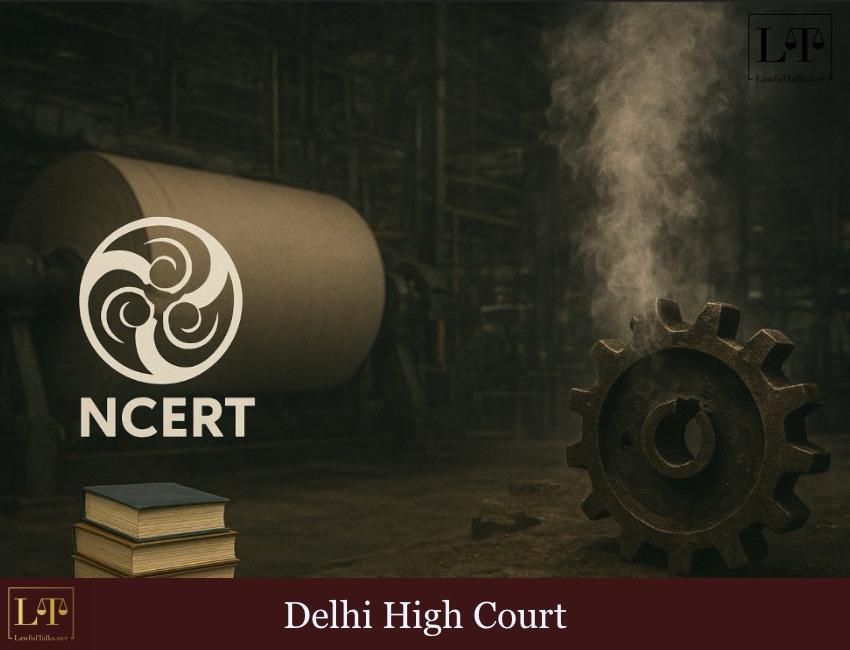Allahabad HC Sets Aside Afzal Ansari's Conviction, Allows Him to Continue as MP

Justice Jasmeet Singh of the Delhi High Court delivered a notable judgment partially setting aside an arbitral award directing the National Council of Educational Research and Training (NCERT) to refund Rs. 2 crore to M/s Murli Industries Ltd.

The Court found fault with the arbitrator’s conclusion that a machinery breakdown amounted to a force majeure event, remarking that “it cannot be said that a technical issue in one part of the machinery was an unforeseeable event. A company engaged in paper manufacturing ought to reasonably foresee and prepare for such occurrences. If breakdown of a part of machinery were to be construed as force majeure, performance of every manufacturing contract would be in jeopardy”.
At the same time, Justice Singh upheld that time was not the main condition of the contract, and therefore ruled that NCERT could not forfeit the performance security without showing actual proof of loss.
Background:
The dispute arose from a 2010 tender floated by NCERT for the supply of 10,000 MT of maplitho paper. Murli Industries emerged as the successful bidder and furnished Rs. 2.04 crore as performance security. Soon after the contract was executed, the company requested an extension owing to technical problems in its machinery and delays related to watermark logo processing.
Later, it informed NCERT that due to a snag in its “second-stage de-inking cell and tackle disc of hot disperser which was imported from Germany,” it was unable to achieve 80% paper brightness and instead offered paper with a 72% brightness level. NCERT refused this proposal, citing deviation from agreed specifications, and proceeded to forfeit the security deposit.
The arbitral tribunal, however, sided with the company, holding that the machinery failure constituted force majeure and ordering NCERT to refund the amount with interest. Challenging this conclusion, NCERT approached the High Court under Section 34 of the Arbitration and Conciliation Act.
NCERT argued that the performance guarantee was a genuine pre-estimate of damages and could be forfeited even without proving actual loss. It further submitted that the arbitrator was wrong in treating a routine mechanical failure as an unforeseeable event. NCERT maintained that time was an essential term of the contract, as the paper supply was crucial for printing textbooks before the start of the academic session. Additionally, they contended that the delay caused substantial disruption to the schedule.
Murli Industries, on the other hand, maintained that the machine defect was unforeseen and beyond its control, thereby qualifying as force majeure. It further asserted that NCERT had suffered no measurable loss because the paper was later sourced from other vendors at identical rates, and that NCERT’s willingness to grant extensions to other suppliers demonstrated that time was not of the essence.
Court’s Observations:
Relying on the Supreme Court’s decision in Energy Watchdog v. CERC, the High Court refused to accept that the equipment malfunction qualified as a force majeure occurrence. The court held that such clauses should be interpreted narrowly and applied only to situations that are truly beyond the parties’ control and not something they could have anticipated when making the contract.
Reiterating that “if breakdown of a part of machinery were to be construed as force majeure, performance of every manufacturing contract would be in jeopardy,”. The Court noted that the arbitrator had wrongly relied on Dhanrajamal Gobindram, as that case only provided general examples and did not lay down binding rules about mechanical failures.
On the question of time, the Court concurred with the arbitral tribunal’s view that NCERT’s own conduct undermined its claim of urgency. The institution had extended deadlines for other vendors and accepted delayed deliveries under the same project.
The contract itself allowed for extensions and the imposition of liquidated damages, showing that the timelines for performance were meant to be flexible, not strict.
Drawing guidance from Welspun Specialty Solutions Ltd., the Court emphasized that “Merely having an explicit clause may not be sufficient to make time the essence of the contract. The existence of an extension mechanism and acceptance of delayed supplies shows that timely delivery was not fundamental to the contract.”
On the issue of forfeiture, Justice Singh noted that Clause 6.02 of the agreement considered the performance security to be a compensatory safeguard, not a genuine pre-estimate of damages.
“A plain reading of Clause 6.02 shows that the performance security was not a pre-estimated damage but a compensatory safeguard. NCERT, having failed to demonstrate any loss, was not entitled to encash the guarantee.”
Referring to Indian Oil Corporation v. Lloyds Steel Industries Ltd., the Court reiterated that such security functions as a guarantee against non-performance, not as liquidated damages per se. Therefore, while the Court disagreed with the arbitrator’s view on force majeure, it agreed that NCERT’s forfeiture of the performance security was not justified.
Final Ruling:
Justice Jasmeet Singh therefore partly allowed the petition, rejecting Murli Industries’ force majeure claim but protecting it from the wrongful forfeiture of the performance security deposit.
Case Details: NATIONAL COUNCIL OF EDUCATION RESEARCH & TRAINING versus M/S MURLI INDUSTRIES LTD. (O.M.P. (COMM) 363/2020)

Anam Sayyed
4th Year, Law Student
Latest Posts
Categories
- International News 19 Posts
- Supreme Court 347 Posts
- High Courts 361 Posts


















































































































































































































































































































































































































































































































































































































































































































































